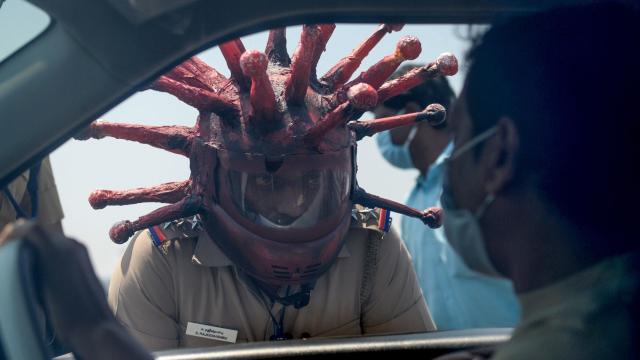Rajesh Babu, a police officer in Chennai, India, has started wearing a helmet while enforcing a lockdown of the country’s 1.3 billion people. But it’s not just any helmet. Babu’s headgear is designed to look like the new coronavirus, which causes the disease covid-19. And it’s just one more sign that our current reality continues to get weirder and weirder as the global pandemic rages on.
India’s Prime Minister Narendra Modi made a surprise announcement on March 24 that everyone in India would be forbidden from leaving their homes for 21 days starting at midnight—the largest mass lockdown in human history. But the lockdown has been met with resistance, as many people were stuck in places they didn’t live and some simply couldn’t find food. India’s enormous homeless population is another thing entirely.
But police officers in India have started to deploy new tactics in an effort to scare the average citizen into staying home, provided they have one. Officers like Rajesh Babu are wearing bizarre helmets, designed like the images released of the new coronavirus. And it’s not just Babu.
Getty Images published new photos overnight showing traffic police in Bangalore, the capital of India’s state of Karnataka, wearing their own coronavirus-inspired helmets. It’s not clear if they were inspired by Babu, who’s over 320 kilometres away.
India, which has 1,251 confirmed cases of covid-19 and at least 32 deaths, is not unique in imposing a strict lockdown of its country. Roughly 75 per cent of Americans are currently in some form of lockdown, according to CNN, and countries like Italy and Spain are in almost total lockdown as well.
But lockdowns do tend to highlight societal inequalities, especially in India, where about 80 per cent of workers are in the “informal sector” meaning that they’re not protected by labour laws.
“I hear there is a virus from China going around,” one young boy from India who scavenges scrap metal from dumps told the New York Times this week. “But I’m more afraid of the police and not being able to eat.”
Even citizens in wealthy countries like Italy are worried about where they’re going to find their next meal, with economies grinding to a halt. People in southern Italy are clashing with police because they’re stuck indoors and simply don’t have access to food.
“It’s already 15 to 20 days that we’ve been inside. We’re at our limit,” one Italian says in a video that has gone viral in Italy and the UK.
“Like my daughter, other children in a few days won’t be able to eat this bit of bread. Rest assured, you will regret this because we’re going to have a revolution.”
And the U.S., which last night saw its death toll from covid-19 surpass the number of deaths from 9-11, has its own problems with inequality, made worse by a very weak social safety net. One teen who recently died of covid-19 was turned away from an urgent care clinic in Lancaster, California and told to go to the emergency room because he didn’t have health insurance, but he went into cardiac arrest on the way there. He was revived at the ER, but died about six hours later, according to the mayor of Lancaster.
In Las Vegas, where the city’s hotels sit empty because of the state’s lockdown, homeless people are still sleeping on the streets. But authorities have adopted new terms to make it sound like the country’s most vulnerable populations are being cared for.
The photo below shows what’s been described as a “temporary homeless shelter” in the parking lot of the Cashman Centre, complete with white lines drawn on the pavement for “social distancing.”
It’s not clear how anyone can dare to use the term “shelter” when looking at that photo. But this is our new reality. Sadly, it looks very similar to our old reality, but with more cops in weird sci-fi helmets.
